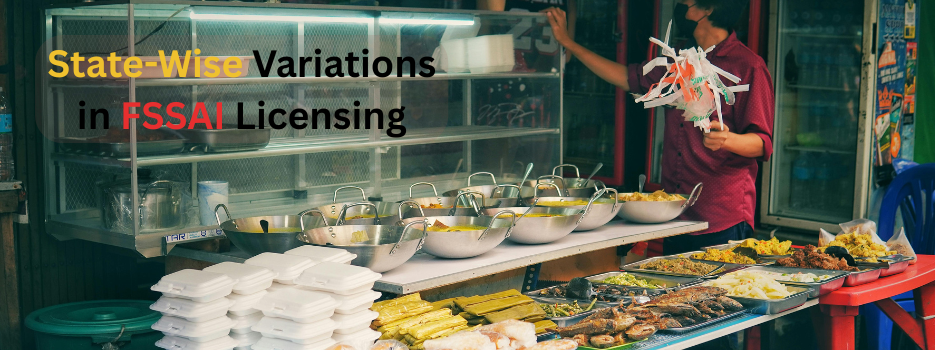The FSSAI licensing framework remains unchanged since it is consistent throughout India. But there are a few changes in registration cost and specific documentation requirements. Food companies must apply for an FSSAI license in India. The license on the food premises ensures that the business is legally registered and adhering to all laws and regulations. The major purpose of the food license is to ensure that businesses are serious about food safety and quality. This complete guide will analyze the primary state-wise variations in food FSSAI licensing, which must be known by all food business operators.
What is the FSSAI Licensing Framework?
Under the Food Safety and Standards Act, 2006, the FSSAI licensing framework is a system. This framework passes the stringent rules for the FBOs so that they can apply for the license or registration based on the business size and turnover. In addition, this framework is governed by the Food Safety and Standards (Licensing and Registration of Food Business) Regulation, 2011. Meanwhile, the food FSSAI license is categorized into three types. Basic registration, state licenses, and central licenses are the three categories of licenses. The small businesses with turnover up to Rs 12 lakh are eligible for basic registration; the businesses with turnover between Rs 12 lakh and Rs 20 crore register for a state license. The last one is the central license, which is mandatory for businesses whose annual turnover is Rs 20 crore.
Key State-Wise Variations for FoSCoS FSSAI Registration
The food business operators must be aware of the following variations:
I. Licensing Charges
Across India, the Central license cost for a food business is fixed. It is around Rs 7,500 per annum. However, the variation comes into the state license. As it is not fixed, the cost ranges from Rs 2,000 to Rs 5,000 per annum. The state license registration cost is determined by each state’s laws.
II. Documentation
There are a few specific documents that are applicable across India. These primary records are the proof of food business establishment, the identity proof of directors/proprietors, and the business constitution documents. But still, some states’ controlling authority demands that the additional documents be provided. The additional documentation is required based on local regulations.
For instance, the State Pollution Control Board or the municipality must provide the businesses with an NOC (No Objection Certificate).
III: Inspection & Compliance
The Schedule 4 guidelines are FSSAI-set national food safety standards. However, this enforcement and inspection method can be significantly different from one state to another. The periodic food safety audits and inspections are conducted by the food safety commissioners and the licensing authority.
IV. Processing Timeline
Apart from documentation and other factors, the timeline of the FSSAI license also depends on the specific state. The application can vary by state due to differences in administrative efficiency and the workload. Most states in India follow the online registration process via FoSCoS, an online portal. There can also be differences in providing the license and resolving queries.
Useful Blog: Compliance Checklist for Cloud Kitchens and Ghost Kitchens under FSSAI
Useful Tips to Navigate the FSSAI-Verifications
The food business operators can effectively navigate the variation challenges that arise during the licensing procedure. To avoid them, follow these tips:
Tip 1: Access the Official Portal
For the food FSSAI licensing or registration, leverage the online platform of the Food Safety and Standards Authority of India, which is FoSCoS. The Food Safety Compliance System (FoSCoS) is an online platform that is used for the FSSAI licensing.
Tip 2: Ensure State-Specific Requirements
Before the final application submission on the FoSCoS FSSAI application, the businesses must carefully review all documents. Including ensuring the specific business and the state/UT.
Tip 3: Consult Local Authorities
For the specific consultation regarding the registration fees, NOCs, and documentation, you must get in touch with the FSSAI’s designated officer or a similar state’s Food Safety Commissioner. Otherwise, contact a private consultant for faster approval.
Tip 4: For the new notification, the food business operators must stay updated on the FSSAI website.
Tip 5: Verify Jurisdiction Correctly
The food business operators must assess their annual turnover, production capacity, and the scope of operations. It is crucial to determine whether you need a basic registration, state license, or central license.
Tip 5: License Timeline and Revival
The food FoSCoS license is useful for a certain timeline. The businesses must apply for FSSAI license renewal on time and submit the annual returns accurately.
Final Discussion
All food business operators must get a valid FSSAI license certificate to ensure the quality standards of food. Licensing or registration is a fundamental requirement to align with the set standard by the FSSAI authority. It can be confusing, though, because of the differences in the fee structure and documentation specific to statistics. Before applying, taking the consultation is useful. But, commonly, the type of food license depends on business size, turnover, and operational scope. Contact us right now to streamline and expedite your registration process.

